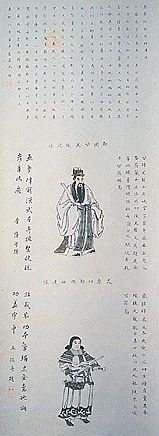Zheng Zhilong
| Zheng Zhilong 鄭芝龍 |
|
|---|---|

Illustration of Zheng Zhilong and his son Koxinga
|
|
| Personal details | |
| Born | 1604 |
| Died | 1661 (aged 56–57) Beijing, Qing Empire |
| Cause of death | Decapitation |
| Spouse(s) | Tagawa Matsu |
| Relations | Father: Zheng Shaozu Mother: Lady Wang |
| Children |
Zheng Chenggong Tagawa Shichizaemon |
| Religion | Catholic, Mazu (goddess), Marici (Buddhism) |
| Noble Rank | Earl of Nan'an→Marquess of Nan'an→Marquess of Tong'an |
| Zheng Zhilong | |||||||||
| Chinese name | |||||||||
|---|---|---|---|---|---|---|---|---|---|
| Traditional Chinese | 鄭芝龍 | ||||||||
| Simplified Chinese | 郑芝龙 | ||||||||
|
|||||||||
| Japanese name | |||||||||
| Kanji | 鄭 芝龍 | ||||||||
| Kana | ジェン・ジーロン | ||||||||
| Hiragana | てい しりゅう | ||||||||
|
|||||||||
| Western name | |||||||||
| Western | Nicholas Iquan Gaspard | ||||||||
| Transcriptions | |
|---|---|
| Standard Mandarin | |
| Hanyu Pinyin | Zhèng Zhīlóng |
| Wade–Giles | Cheng Chih-lung |
| Transcriptions | |
|---|---|
| Revised Hepburn | Tei Shiryū / Jen Jīron |
Zheng Zhilong (1604–1661), also known as Nicholas Iquan Gaspard, was a Chinese merchant, pirate and military leader in the late Ming dynasty who later defected to the Qing dynasty. He was from Nan'an, Fujian. He was the father of Zheng Chenggong (Koxinga), the founder of the pro-Ming Kingdom of Tungning in Taiwan. After his defection, he was enfeoffed as a Count of the Second Rank by the Qing government, but was eventually executed because of his son's continued resistance against the Qing regime.
Zheng was born in Nan'an, Fujian, the son of Zheng Shaozu (鄭紹祖), a mid-level financial official for the Quanzhou government, and Zheng Shaozu's wife Lady Huang (黃氏). Contemporary biographies tell a possibly apocryphal story of how when Zheng was a child, he and his brothers wanted to eat longan fruit. They found a fruit tree in an enclosed courtyard but whose branches hung over the top of the wall into the street. They threw stones in the hope of knocking some of the fruit clusters loose. It happened to be the courtyard of the governor of Quanzhou City, and he was struck by the stones. The boys ran but were caught and hauled before the governor. Due to the child's age and apparent charisma, the governor forgave Zheng and released him, saying "This is the face of one destined for wealth and nobility." The story may or may not be true, but it encapsulated the character of Zheng: he ran wild, grasped at low hanging fruit, got in trouble, and came out the better for it.
Zheng left home as a teenager, jumping aboard a merchant ship. Sources vary on why he left home, some saying he slipped his hand up his stepmother's skirt, others recording his father chasing him through the streets with a stick. Zheng went to Macau where his mother's brother lived (his uncle). He was baptized as a Catholic in Macau, receiving the Christian name Nicholas Gaspard. His uncle asked him to take some cargo to Nagasaki, Japan, where he met a rich old Min man named Li Dan, also known as "Captain China", who became his mentor and possible homosexual lover. Li Dan had close ties with the Europeans and he arranged for Zheng to work as an interpreter for the Dutch (Zheng spoke Portuguese which the Dutch could also speak). In 1622, when Dutch forces took over the Pescadores archipelago off the Taiwan Strait, Li Dan sent Zheng to the Pescadores to work with the Dutch as a translator in peace negotiations. Before leaving Japan he met and married a local woman named Tagawa Matsu. He impregnated her with Zheng Chenggong (Koxinga), leaving Japan before she gave birth in 1624. After Li died in 1623, Zheng acquired his fleet of ships.
...
Wikipedia
